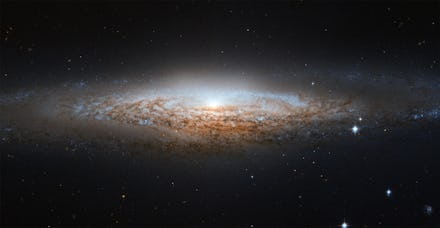You Technically Are the Center of the Universe, Thanks to a Wacky Physics Quirk

Physics has a mind-bending implication that seems to undermine a fundamental lesson we all learned in grade school about selfishness: You technically are the center of the universe.
To understand why this is true, it's important to know that the universe is expanding all around us, and all the objects in it are accelerating as they move farther and farther apart.
We know this is true thanks to the Doppler Effect. You've experienced the Doppler Effect if you've ever had an ambulance speed past you with its siren blaring. Once the ambulance passes you, the siren suddenly drops in pitch. This happens because the sound waves get stretched as the ambulance travels away from you.
Light waves also behave the same way. If we peer out into space, we can see galaxies look more red because they're speeding away from us and the wavelengths of light get stretched out toward the red end of the spectrum of visible light.
So why does it matter that the universe is expanding? Because no matter where you stand, it will appear that everything in the universe is expanding around you. So the center of the universe is technically — everywhere.
This is called the cosmological principle. The moment you pick a frame of reference, that point becomes the center of the universe.
Here's another way to think about it: The sphere of space we can see around us is the visible universe. We're looking at the light from stars that's traveled millions or billions of years to reach us. When we reach the 13.8 billion-light-year point, we're seeing the universe just moments after the Big Bang happened.
But someone standing on another planet, a few light-years to the right, would see a different sphere of the universe. It's sort of like lighting a match in the middle of a dark room: Your observable universe is the sphere of the room that the light illuminates.
But someone standing in a different spot in the room will be able to see a different sphere. So technically, we are all standing at the center of our own observable universes.
Of course, this is only true if the universe is infinite. And physicists actually have no idea whether the universe is infinite or not.
But if it is infinite, then this bubble universe idea gets really wacky. It implies that multiple universes exist. Someone could be standing on a planet outside our sphere of visibility from Earth, and when they look through a telescope, they're seeing an entirely different sphere of the universe illuminated. They can see stars and planets that we can't.
We might just be one bubble in an infinite soup of other universes.
So sure, you can claim to be the center of the universe, but you also have to acknowledge that there are, potentially, an infinite number of other universes out there.
Doesn't leave you feeling so special, after all.